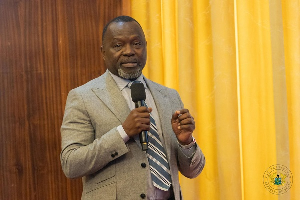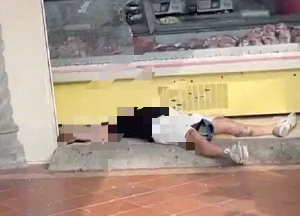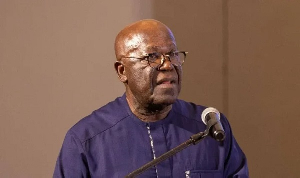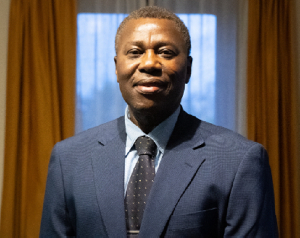By Kofi Ata, Cambridge, UK
Yesterday, the Justices hearing the December 2012 Presidential Petition brought by Nana Akufo Addo et al before the Supreme Court (SC) took a giant step towards bringing an end to the long delay in hearing the petition. In this post election piece, I will attempt to discuss the potential implications of the ruling and further directions from different perspectives.
The Justices ruled that, there are two substantial issues be considered at the hearing and for them to make a decision on. The two are: “whether or not there were statutory violations, omissions, irregularities and malpractices in the conduct of the elections held on December 7 and 8, 2012; and “whether or not the said violations, omissions, irregularities and malpractices affected the outcome of the results of the elections” (see “Supreme Court sets two issues for trial in Election Petition”, Ghanaweb, April 2, 2013).
The Justices also gave further directions on the modalities for the hearing and these are: “all witnesses would have to come by affidavit and consequently directed the parties to file affidavit of witnesses they intend to call, however the petitioners and respondents would give their evidence orally”.
I will consider the ruling first and the further instructions later. The question I posed in the title could be answered yes, no or both. Whichever answer one opts for may have different meanings or interpretations for different stakeholders. For detractors of Nana Akufo Addo, the obvious answer would be yes with only one meaning and interpretation. That is, considering the reliefs contained in the original petition to the SC, this judgement is an indication that, the SC would not declare Nana Akufo Addo winner of the December 2012 presidential election. Therefore this is the beginning of the end for Nana Akufo Addo’s political ambition and perhaps his political career. For those who hold such views, they must thread very carefully because the judicial battle field is littered with the dangers and victims of simplicity, unreliable assumptions, wrong interpretations and application of statutes (both primary and secondary).
On the other hand, those on the side of Nana Akufo Addo have the privilege of answering the question either way and interpret each or both answers in their favour. Yes, in the sense that there appears to be light at the end of the tunnel for Nana Akufo Addo because the delay in hearing the petition is over. Yes, because the battle lines have been drawn bold and clear and soon the petitioners would have the opportunity to present the huge volume evidence of irregularities, fraud, theft and rigging that they claim to have gathered to the Justices to establish beyond any reasonable doubt that, there were not only statutory violations, omissions, irregularities and malpractices in the conduct of the elections held on December 7 and 8, 2012 but also the said violations, omissions, irregularities and malpractices affected the outcome of the results of the elections. As a result, Nana Akufo Addo would be declared winner and soon installed President of the Republic of Ghana.
This group can also answer the question with a no and interpret it as follows. That the real battle is yet to begin and from the evidence in the arsenal of the petitioners from the 11,900 plus polling stations, the worst outcome of the petition would be a re-run and therefore, the end is no near for Nana Akufo Addo. However, he will win a re-run of the election if ordered by the SC because the fraud, theft and rigging perpetrated during the December 2012 presidential election by some or all of the respondents would put him in good stead in the eyes of the public to win hands down. For this second group who can answer both yes and no, I have the same advice for them as those for the detractors. Your answers and interpretations could be over confident. Be careful.
Then there is a third group who are neutral observers or pro Ghana who could also answer the same question either way but reach different interpretations to the ones discussed above. For them, they could simply say, yes and explain that at long last the SC is getting somewhere with the petition. In other words, the wait for Nana Akufo Addo and his supporters would soon come to an end. However, it is too early to conclude which way the final decision will go. In other words, the reverse answer of no. That is, this is not the beginning of the end for Nana Akufo Addo because the case could go either side, so until the final decision by the SC, no one should guess the final outcome of the petition, let alone the end for Nana Akufo Addo, his political ambition or career. Even if at the end of the hearing the Justices decide that there should a rerun of the presidential election, Nana Akufo Addo lives to fight another day. The above scenarios could equally apply to President Mahama by asking the same question with similar answers and interpretations depending on which side one is.
Let’s consider the implications for the further instructions regarding the format for the hearing. The Justices decided that “all witnesses would have to come by affidavit and consequently directed the parties to file affidavit of witnesses they intend to call but the petitioners and respondents would give their evidence orally”.
This must be a big blow to the first respondent, President John Dramani Mahama who had earlier indicated irrationally that he intended to call 11,000 witnesses from the disputed polling station results. Mr President, how would you have done that and was this just to go into the Guinness Book of Records for being the first do call such a large number of witnesses in a court case? That was pathetic and could only be interpreted as a ploy to stall proceedings until you complete the four year term before the end of the petition. Your wings have been clipped by the SC and you will have to make do with yourself and your joiners in the witness box, if you so wished.
The fact that the Justices also ordered that the petitioners provided their affidavit to the respondents to enable them file their responses by way of affidavit is also a blow to Nana Akufo Addo et al who also initially refused to provide further particulars for fear giving ammunition to the respondents to defend themselves. By this directive, the element of surprises which the petitioners wanted to hold as close guarded secret and use it as the smoking gun against the respondents has also been decapitated by the Justices. The SC is warning the parties, especially the petitioners and the first respondent that, as Justices, they will take no casualties or hold any captives, though one could say that there are already casualties and captives on both sides.
Having said the above, does yesterday’s ruling and directives by the Justices say anything to the parties involved, particularly the petitioners and the first respondent? For me, personally, the SC ruling and directives have opened a can of worms or the Pandora Box and anyone who would read too much or too little into them and attempt to postulate the final outcome, run the risk of committing judicial suicide at the end of the case. To simply conclude that because the two issues identified by the Justices do not bear the exact resemblance to the reliefs contained in the originating or amended petition is to deny the fact that, the SC has wide ranging powers to make any declarations and grant any reliefs that they deem fit and appropriate at the end of the hearing, which would be on the basis of matters of facts and law. In the same vein, to say that because the 11,000 witnesses could no longer be called by the first respondent, his back is against the wall is to put too much weight to what value those witnesses could have added.
It is important to bear in mind that, the SC only ruled on what issues would be determined during the hearing. This ruling did not include what declarations the Justices would order or reliefs they will grant at the end of the hearing. For those who may rely on this limited decisions by the SC to conclude that the petition will go the same way as that of Kenya, that is, the petition would be rejected could be mistaken. Ghana is not Kenya and especially, since we are not privy to the evidence at the disposal of the petitioners as well as those of the respondents.
Notwithstanding the aforesaid, it appears from the ruling that the SC has raised the bar in this petition by limiting the issues to just two and eliminating all unnecessary and unlimited witnesses. The burden of proof is on the petitioners to prove their case. In addition to the petitioners proving that there were fraud, theft and rigging, they must also persuade the Justices that the fraud, theft and rigging did indeed affect the outcome of the December 2012 presidential election. These are not easy tasks for the petitioners but they are doable since the petitioners claim that they have assembled sufficient and credible evidence to satisfy the Justices that over 4.6 million votes should be invalidated.
The only warning I have for the petitioners is, carefully read the SC ruling on the two substantial issues identified. They should read “the fine print” and that is, the word “STATUTORY”. The ultimate statutory requirement is the Constitution.
The petitioners are asking the SC to disenfranchise over 4.6 million Ghanaian voters simply because and according to them, the voters did not go through Biometric Verification Machine. I have written about this matter previously and do not intend to repeat myself, except to say that, this demand or relief being sought by the petitioners is almost irrational and against the spirit of the 1992 Constitution which guarantees the right to vote. This is one of the fundamental human rights in a democratic society and could not be easily taken away by whims and caprices of any individual/s, political party or parties, not even the highest court of the land. For this reason, the petitioners should not bank their hope on the SC disenfranchising over 4.6 million voters. If this is their strongest weapon, then they should immediately think of plan B because it will not meet the “statutory” requirement in the ruling. The word STATUTORY in the ruling is what we call “Mind the Gap”.
In conclusion, whichever way you interpret the SC ruling and directives to draw your conclusion, whether positive, negative or neutral and whichever side you are, my answer is, do not under estimate the complexity and simplicity of preliminary judicial rulings. It is too early to draw any definite and valid inferences from them. Whatever the outcome of this petition, whether there will be a sudden death for any of the parties involved by way of ambition, political future or both, only time will tell. Nonetheless, I am sure Nana Akufo Addo still has a long way to go.
Kofi Ata, Cambridge, UK
Opinions of Wednesday, 3 April 2013
Columnist: Ata, Kofi














